Carbon dioxide - Prandtl Number vs. Temperature and Pressure (original) (raw)
The Prandtl Number - Pr - is a dimensionless number approximating the ratio of momentum diffusivity (kinematic viscosity) to thermal diffusivity - and is often used in heat transfer and free and forced convection calculations.
The Prandtl number can for calculations be expressed as
Pr = μ Cp / k (1)
where
μ = absolute or dynamic viscosity (kg/m s, lbm/(ft h))
Cp = specific heat (J/kg K, Btu/lbmoF)
k = thermal conductivity (W/m K, Btu/(h ft2oF/ft))
Below, Prandtl numbers for carbon dioxide at varying temperatures and pressures are given in figures and table.
See also other properties of Carbon Dioxide at varying temperature and pressure: Density and specific weight, Dynamic and kinematic viscosity, Specific heat (Heat capacity) and Thermal conductivity, and Thermophysical properties at standard conditions,,
as well as Prandtl number of Air, Ammonia, Methane, Nitrogen, Propane and Water .
Carbon dioxide Prandtl number at gas-liquid equilibrium pressure, temperature given as °C or °F:
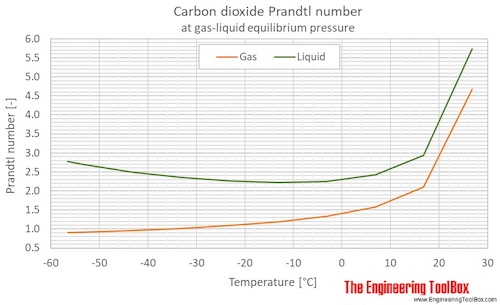
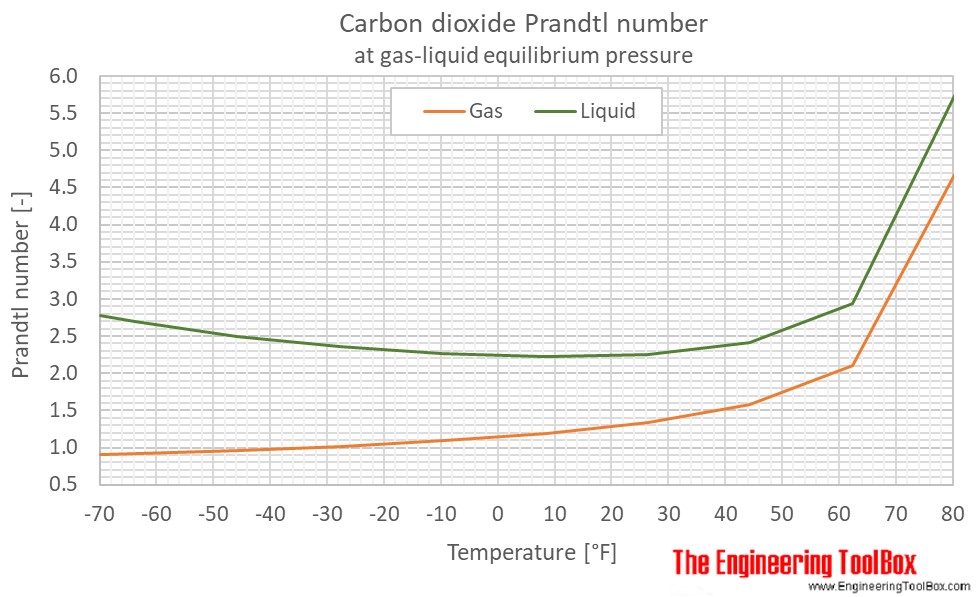
Carbon dioxide Prandtl number at atmospheric pressure, temperature given as °C and °F:
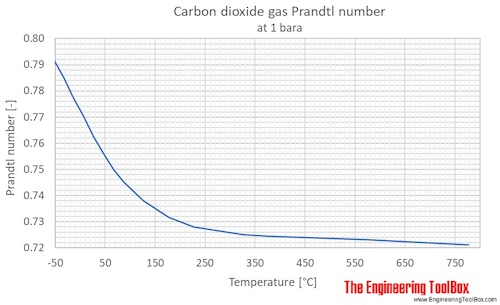
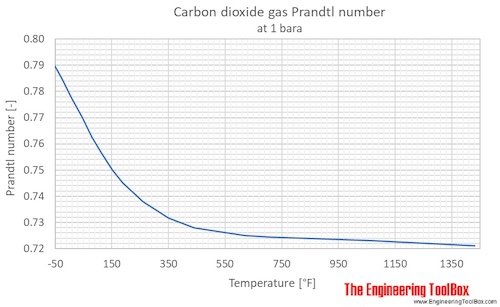
Carbon dioxide Prandtl number at varying temperatures at given constant pressures, SI and Imperial units:
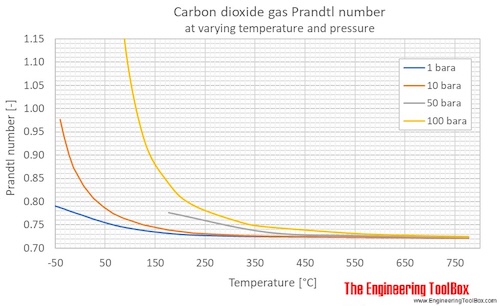
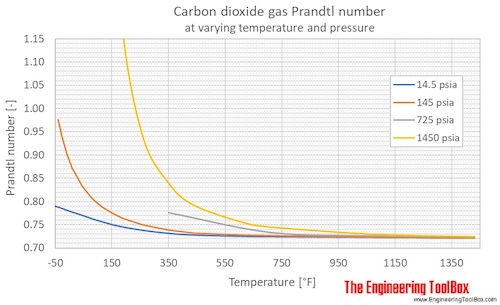
Carbon dioxide Prandtl number at given temperatures and 1, 10, 50 and 100 bara presure:
Carbon dioxide - Prandtl Number vs. Temperature and Pressure
| Temperature | Prandtl number at given pressures | |||||
|---|---|---|---|---|---|---|
| (K) | (°C) | (°F) | 1 bara | 10 bara | 50 bara | 100 bara |
| 220 | -53.2 | 2.5 | 0.792 | 2.70 | ||
| 233.03 | -40.1 | 9.7 | 0.977 | |||
| 240 | -33.2 | 13.6 | 0.785 | 0.942 | 2.32 | |
| 250 | -23.2 | 19.1 | 0.781 | 0.902 | 2.23 | 2.16 |
| 260 | -13.2 | 24.7 | 0.777 | 0.873 | 2.10 | |
| 280 | 6.9 | 35.8 | 0.770 | 0.833 | 2.06 | |
| 287.43 | 14.3 | 39.9 | 2.74 (liq) | |||
| 287.43 | 14.3 | 39.9 | 1.92 (g) | |||
| 300 | 26.9 | 46.9 | 0.763 | 0.807 | 2.39 | |
| 320 | 46.9 | 58.0 | 0.756 | 0.788 | 4.08 | |
| 340 | 66.9 | 69.1 | 0.750 | 0.774 | 1.53 | |
| 360 | 86.9 | 80.3 | 0.745 | 0.764 | 1.17 | |
| 400 | 127 | 102 | 0.738 | 0.749 | 0.938 | |
| 450 | 177 | 130 | 0.732 | 0.739 | 0.776 | 0.840 |
| 500 | 227 | 158 | 0.728 | 0.732 | 0.792 | |
| 600 | 327 | 214 | 0.725 | 0.727 | 0.754 | |
| 650 | 377 | 241 | 0.725 | 0.726 | 0.734 | 0.745 |
| 850 | 577 | 352 | 0.723 | 0.724 | 0.726 | 0.730 |
| 1050 | 777 | 464 | 0.721 | 0.721 | 0.723 | 0.724 |
Related Documents
Air Properties - Density, Viscosity, Heat Capacity, Thermal Conductivity, and more
Thermal properties of air, including density, viscosity, thermal conductivity, specific heat and more at different temperatures and pressures. Comprehensive reference with formulas, tables, and charts to support engineering calculations.
Carbon Dioxide - Liquid Properties
Properties of saturated liquid Carbon Dioxide - CO2 - density, specific heat, kinematic viscosity, thermal conductivity and Prandtl number.
CO2 Calculator - Emissions from Cars
Calculator for CO2 emissions from different kind of cars (gasoline, diesel, LPG, electrical), comparing with alternative forms of transportation (as airplane, bus and train).
Gases - Specific Gravities
Specific gravities of air, ammonia, butadiene, carbon dioxide, carbon monoxide and some other common gases.
Solubility of Gases in Water vs. Temperature
Solubility of Ammonia, Argon, Carbon Dioxide, Carbon Monoxide, Chlorine, Ethane, Ethylene, Helium, Hydrogen, Hydrogen Sulfide, Methane, Nitrogen, Oxygen and Sulfur Dioxide in water.
